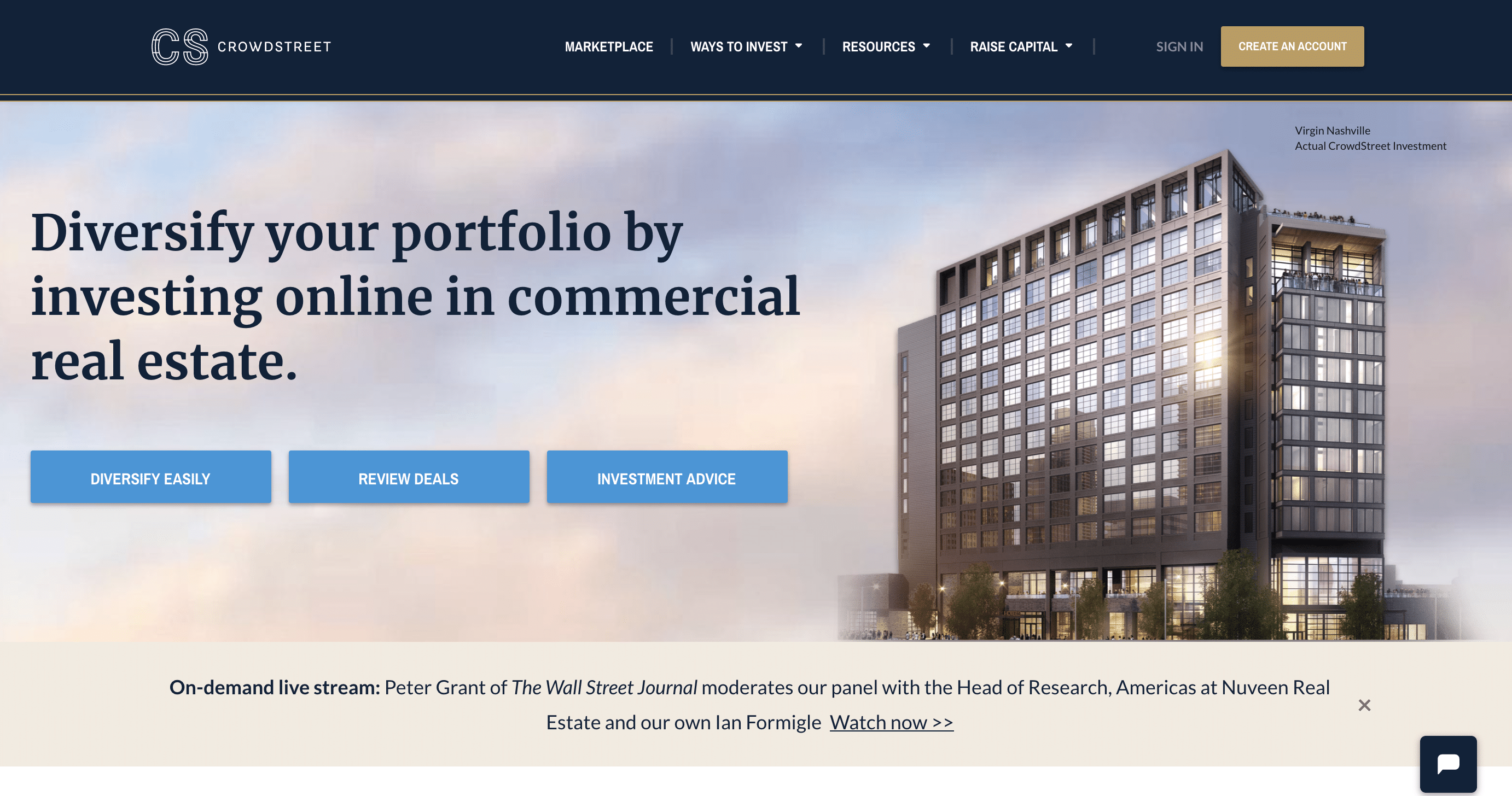Real estate has always provided investors with an added layer of diversification. It’s typically uncorrelated with the stock market, generates steady income, while potentially producing higher returns.
Commercial real estate crowdfunding is only one piece of the equation. Because of this, more and more investors gain access to institutional-quality projects. If you’re considering investing in this asset class, CrowdStreet might make sense.
In this Crowdstreet review, we’ll examine investment offerings, minimums, and how its crowdfunding platform operates. In short, if you want to diversify your portfolio with commercial real estate, read this review.
What Is CrowdStreet?
CrowdStreet connects individual investors with sponsors who seek funding for commercial real estate investment projects. All deals are institutional-quality, thoroughly vetted, and fulfilled entirely online.
You can review, research, and choose deals yourself; invest through a fund, or open a privately managed account with an advisor.
CrowdStreet boasts dollar-weighted averages of a 26.3% XIRR*, $1.13 billion total funds invested, $120 million distributed to investors, with an average hold period of 2.1 years.
You can compare and review all deals on the site with total transparency. See financials, register for live webinars with sponsors, and submit offers online.
CrowdStreet’s team combines 120 years of experience with over $6.5 billion in transactions.
Tore Steen and Darren Powderly co-founded CrowdStreet and launched it in 2014. Since then, they’ve published over 409 commercial real estate offerings. They’re based in Portland, Oregon.
Editor's Note
Note: XIRR differs from IRR. CrowdStreet defines XIRR as the Extended Internal Rate of Return used to calculate irregular cash flows.
How Does CrowdStreet Work?
Creating an account is free, and you don’t need to be accredited to sign up. However, you will need to prove you’re accredited before investing money.
You’ll choose how you want to invest, whether through a diversified real estate fund, build your own portfolio of individual deals, or through its advisory service.
When you’re ready to invest and confirm you’re accredited, Crowdstreet notifies you of investment opportunities, and you can access all project-related information through your dashboard.
You can compare and review all deals on the site, view financials, register for live webinars with sponsors, submit offers, and track investments.
All projects have an Offering Detail page, including the sponsor’s track record.
Offerings have a 3-day evaluation period when new projects are added to the marketplace and end when the webinar begins. You can ask the sponsor questions via the live webinar.
The evaluation period lets you review all project details. Deals are first come first serve with some closing quickly once the period ends.
Invest in institutional-grade commercial real estate projects. Property types include multifamily, office, retail, and land. You'll pool money alongside other investors and have direct access to sponsors. Choose to invest in individual deals, funds, or access its advisory service.
CrowdStreet’s 3-Step Vetting Process
CrowdStreet meticulously examines and thoroughly vets all deals with only five out of every 100 deals making it onto its platform.
- Sponsor Vetting: CrowdStreet evaluates sponsor or developer’s track record, including a deep background and reference check.
- Asset Review Deal: CrowdStreet checks to see if the deal matches the criteria of the sponsor’s background as well as if it fits within the parameters of Crowdstreet investors.
- Offering Terms Review: Due diligence is performed and the deal is checked against their “standard investor deal terms criteria matrix.”
When considering fund investments, Crowdstreet constructs the portfolio using its proprietary algorithm including:
- Target allocations of investment types
- Portfolio composition of previous investments
- Effect of new portfolio investments
| Emerging | Seasoned | Tenured | Enterprise | |
|---|---|---|---|---|
| Entity Longevity | 5 years or less | 5+ years | Must be 10+ years | Must be 15+ years |
| Principal Experience | at least 2 years | 10+ years | 10+ years | 30+ years |
| Portfolio Activity | Less than $100M | Must be $100M+ | Exceeds $500M | Exceeds $5B |
You can read more about the vetting process here.
Once vetting is complete, CrowdStreet assigns the sponsor an experience-level category of emerging, seasoned, tenured, or enterprise.
Once the process is complete through the offering terms review, the structure of the deals typically found are:
- Common or Joint Venture (JV) Equity
- Preferred Equity
- Mezzanine or 2nd Position Debt
CrowdStreet Features
| Minimum Investment | $25,000 |
| Fees | 1% - 1.5%; advisory fees vary based on amount invested; other deal-specific fees apply |
| Accounts Supported | Taxable, Self-Directed IRAs |
| Investment Length | 2 - 12 years |
| Distributions | Vary by project, typically quarterly or monthly |
| Property Types | Multifamily, office, retail, mixed-use, housing, storage, industrial, land |
| Investment Selection | Private real estate debt and equity |
| Accredited Investors | Yes |
| Mobile App | No |
| Customer Support | Email, phone, chat |
Fees: These vary by investment. CrowdStreet’s Blended Portfolio carries a 1% management fee while its Opportunity Zone fund is 1.5%.
If investing in individual real estate deals, the sponsor covers all fees. Information regarding how the sponsor is recouped are found in the Offering Detail page.
Advisory fees for CrowdStreet Private Accounts vary by investment size.
Minimum Investment: $25,000 for individual projects and the Blended Portfolio; $100,000 for the Opportunity Zone Fund; $250,000 for Private Account Management.
Account Types: Taxable and Self-Directed IRAs (SD-IRA). The IRA custodian is up to you. However, Crowdstreet built its platform to integrate with Millennium Trust, Entrust, and Equity Trust.
1031 Exchanges are possible but CrowdStreet says it rarely lists investments available to accept them.
Your IRA may have tax implications due to Unrelated Business Taxable Income (UBTI). Check with a CPA to find out the tax treatment of investing through your IRA.
Ask the general partner or LLC manager if the investment generates UBTI.
Distributions: All distributions are listed on the Offering Detail page. It varies from project to project. Depending on the investment, you may not get paid until the term is up. If your deal has distributions, they’re typically quarterly or monthly.
Investment Selection: Investments range between real estate debt and equity. However, a wide, accessible selection exists beneath that umbrella. When I scanned both upcoming and closed offerings on the marketplace, I encountered multiple properties.
Depending on how you’d like to invest, CrowdStreet features less common property types including industrial, land, medical offices, senior housing, storage, student, and manufactured housing.
CrowdStreet Investment Opportunities
You’ll have three ways to invest on CrowdStreet. You can choose to invest online directly into the marketplace, invest in a fund or vehicle managed by Crowdstreet or its affiliates; open a Private Managed account with a CrowdStreet registered investment advisor.
You’ll have support through every step of the investment process.
The securities sold on CrowdStreet’s marketplace are private, illiquid investments, and not publicly traded. You should have low-liquidity needs and be comfortable with your money being locked away for several years.
You must confirm you’re an accredited investor to access its real estate projects. To qualify, your:
- Last two years of income must exceed $200,000 ($300k if combined with a spouse)
- Net worth must exceed $1 million
- Assets in a trust must exceed $5 million
Individual Deals
If you prefer DIY-real estate investing, you can access CrowdStreet’s marketplace to find the deals you’d like to include in your portfolio.
You’ll directly invest in the project you choose (no one picks deals for you). You’re in control and all investments are passive.
You’re part of a syndicate collectively contributing to the equity of institutional-quality projects.
You can sort individual deals by several criteria including sponsor experience, property type, and investment profile. Or sort by asset class and location.
Editor's Note
Editor’s Note: I created a free account to look around even though I’m not accredited. Crowdstreet appears to encourage any potential investors to explore its platform.
Funds and Vehicles
CrowdStreet manages portfolios for clients who’d like to remain hands-off. You can instantly have a diversified portfolio in a single fund managed by their in-house team.
Projects within the funds use a rules-based approach determining investment eligibility and are from the CrowdStreet marketplace. You’ll get detailed reports, tax documents, and can track your investment from the dashboard.
CrowdStreet’s Blended Portfolio features between thirty to fifty institutional-quality projects and carries a 1% management fee.
Funds are diversified across:
- Sponsor Experience (tenured, emerging, and seasoned)
- U.S. Regions (e.g., south, midwest)
- Investment Profiles (e.g., core, core-plus, value-add)
- Ten Asset Classes (including student and senior housing, retail, office, mixed-use, and multifamily)
Crowdstreet’s Opportunity Zone fund targets underserved communities defined by individual census tracts and nominated by America’s governors. Opportunity Zones carry specific tax benefits meant to spark economic growth.
The preferential tax treatment depends on how long you’ve held your investment and includes deferment, reduction, or elimination of capital gains.
The Opportunity Zone fund carries a 1.5% management fee and requires a $100,000 minimum.
Managed Investing
CrowdStreet offers an advisory service to clients in the form of its Private Managed Account service. All portfolios are custom-built suited to your financial needs and risk profile.
The advisor makes investments for you which are available on CrowdStreet’s marketplace.
You’ll gain access to a dedicated service team equipped with a personal Client Relationship Manager. You’re able to track your investments through the Portfolio Center.
Accessing the Private Managed Accounts requires a $250,000 minimum balance. Fees vary based on investment size.
If you’d like a professionally managed commercial real estate portfolio, schedule a call with their representative and complete the online questionnaire. They will generate a recommended portfolio based on these results.
CrowdStreet Advisors, LLC, is a subsidiary of CrowdStreet and a federally registered investment advisor.
Editor's Note
Note: All projects follow a direct-to-investor model letting you contact sponsors throughout the deal’s duration.
CrowdStreet Investing Philosophy
CrowdStreet invests in middle markets ranging between $15 to $50 million in value. Acquiring properties in middle markets (aka 18-hour cities) is easier because there’s less competition from large institutions.
Less competition means easier access to deals.
Tweet ThisMiddle markets typically carry a lower cost of living while having favorable employment and population growth above national averages.
CrowdStreet has also cited an inefficient system for acquiring these assets and saw an opportunity for improvement.
Education, Resources, and Support
CrowdStreet’s Help Center provides you access to live webinars with sponsors (including new investor live streams and orientations) where you can ask them questions directly.
Its website also has ample reading material in the form of industry-related articles and guides.
Visit its Marketplace Performance page for a full list of all deals going through CrowdStreet’s platform.
You can also message the deal sponsor directly inside your dashboard under “Messages.” Customer support is available via email, phone, or live chat.
CrowdStreet Comparison
Minimum Investment:
$25,000
Management Fees:
1%-1.5%, other fees apply
Promotion:
Invest In Commercial Real Estate
Investment Type:
Debt and equity
Investment Model:
Crowdfunded
Accredited Investors Only:
Yes
Mobile App:
No
Minimum Investment:
$1,000
Management Fees:
3% upfront, 2% annually
Promotion:
Create an Account
Investment Type:
Commercial equity REITs
Investment Model:
Online
Accredited Investors Only:
No
Mobile App:
No
Minimum Investment:
$10
Management Fees:
1% a year
Promotion:
Free Upgrade to Core Plan
Investment Type:
eREITs
Investment Model:
Online
Accredited Investors Only:
No
Mobile App:
Yes
Is CrowdStreet Right for You?
Whether you decide to use Crowdstreet’s platform depends on your risk tolerance, liquidity needs, and whether or not you can afford to lose it all. The investments carry higher risks, are complex, and suited to match specific investor profiles.
What’s to Like
- Institutional-Quality Real Estate Projects: Only the best of the best make it onto CrowdStreet’s platform. Only five out of every one hundred deals are accepted.
- User-Friendly: While navigating inside the dashboard, I easily located deals with complete details of my portfolio and all transactions.
- Direct-to-Investor Model: All deals are structured, letting you invest directly in the projects with the ability to contact sponsors and developers.
- Deal Transparency: The Offering Detail page includes all information for projects with a complete breakdown, including fees, distributions, lengths, and terms. You’ll also find the sponsor’s co-investment for the project.
- Potentially High Returns: CrowdStreet’s dollar-weighted average realized returns boasts an XIRR of 26.3%.
What’s Not to Like
- Illiquid Deals: If your time horizon is short, CrowdStreet won’t be a good fit. All of the deals I saw on its platform had a two-year minimum. Most had considerably longer timeframes.
- High Minimums: Individual deals and its Blended Portfolio have a $25,000 minimum. Gaining access to its advisory service requires a steeper cost of $250,000.
- Accredited Investors: CrowdStreet is only available to high net worth individuals. You must meet the requirements of either a $200,000 income from the previous two years ($300,000 with a spouse), have a net worth exceeding $1 million, or have a trust with assets exceeding $5 million.
Final Thoughts
Previously inaccessible, private commercial real estate investments like those CrowdStreet offers have lowered the barrier to entry.
While only available to accredited investors, the platform isn’t without merit. CrowdStreet’s customer support and deal transparency are stellar.
The costs are higher than investing through other platforms. For example, an eREIT through Fundrise or commercial real estate via the Streitwise platform is less expensive.
However, its complex deals and sophistication level demand you perform due diligence to ensure you precisely know what you’re investing in, the risks involved, and whether it belongs in your portfolio.
If you meet the minimum investment requirements, CrowdStreet might make a good fit in your portfolio.







